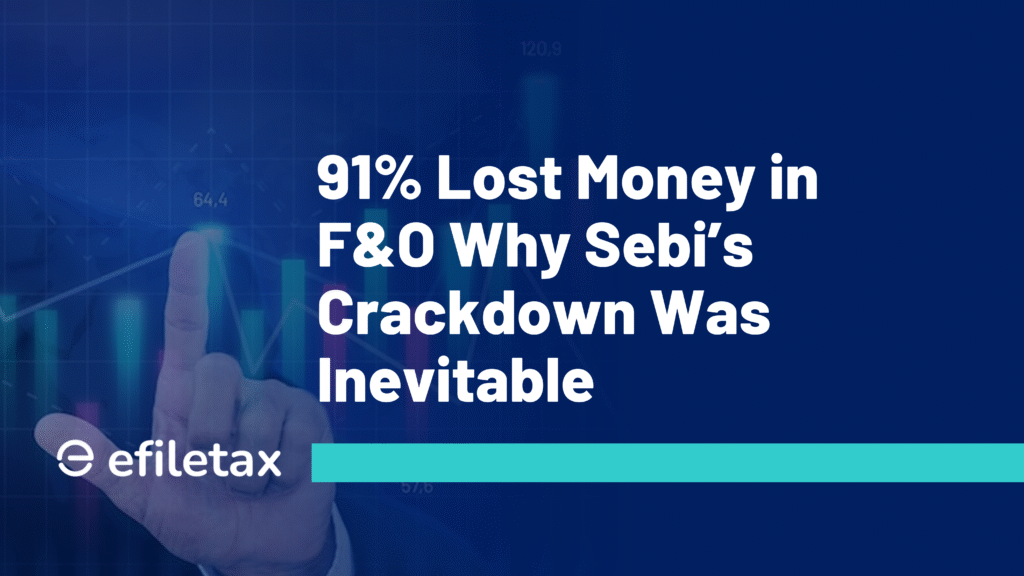
Retail F&O Losses in FY25 What Indian Traders Must Know
Retail investors lost over ₹1.06 lakh crore in F&O trading in FY25 — and 91% of them ended up in the red, just like the year before. This shocking stat from SEBI isn’t just a trading alert. It’s a wake-up call for taxpayers, consultants, and anyone in the business of capital markets.
Let’s break down what happened, what changed with SEBI’s November 2024 reforms, and what you must know about taxes, losses, and audit risk in futures and options.
What triggered these massive F&O losses?
SEBI’s April 2024 study, based on ITR and exchange data, showed:
- Retail F&O turnover in FY25: ₹64.5 lakh crore
- Number of traders: 45.6 lakh
- Net loss by individuals: ₹1.06 lakh crore
- 91% of them lost money despite rising index levels
- Avg loss per trader: ₹2.3 lakh
Most traders mistook volume for skill. But high-frequency trading (HFT) firms and market makers dominated, while retail investors were left with volatile positions, poor tax handling, and audit exposure.
What changed in November 2024?
SEBI brought in new rules effective 24 November 2024 to cool down F&O frenzy:
- Upfront disclosures by brokers on F&O risks
- Restricted marketing of options trading as a “wealth-building” tool
- Enhanced suitability checks for high-risk segments
- Monthly F&O loss statements by brokers to clients
Result?
A visible drop in F&O trading volumes and fewer new traders entering the market.
📌 Expert View:
Brokers now need to assess your financial profile before onboarding you for F&O. If you’re salaried or new to capital markets, you might be rejected.
Tax rules for F&O trading in India
F&O income is treated as business income under the Income-tax Act, 1961 — even if you’re not a full-time trader.
Key tax implications:
| Particulars | F&O Tax Treatment |
|---|---|
| Head of Income | Business Income (Section 28) |
| ITR Form | ITR-3 or ITR-4 (if under presumptive) |
| Audit requirement | If turnover > ₹10 crore (or ₹1 crore w/o digital) or if losses claimed under Section 44AB |
| Tax rate | As per slab or 6% presumptive (if eligible) |
| Loss set-off | Allowed against other business income |
| Carry forward of losses | Up to 8 years (only if ITR filed on time) |
🔎 CBDT Source: Income Tax Act – Section 44AB
Are your F&O trades attracting audit risk?
Yes — especially if:
- You show frequent losses but no professional setup
- You don’t maintain books of accounts under Section 44AA
- You file ITR-1 or ITR-2 despite active F&O trading
- You try to hide speculative activity as capital gains
📌 Tip:
If your F&O loss is ₹2–3 lakh or more, don’t blindly file under ITR-1 or ignore audit rules. It might trigger scrutiny or a defective return notice (Section 139(9)).
What should retail traders do now?
- Review your tax filing status — use ITR-3 if you’ve done F&O trades
- Keep books of account if you’ve crossed ₹10 lakh turnover
- Avoid hiding losses — disclose and carry forward
- Get audit done if your losses exceed the limits
- Switch to safer instruments if you’re repeatedly losing
📌 Hidden Angle:
If you’re salaried and doing F&O on the side, the combined income may push you into audit territory. Be alert.
What’s the deal with Jane Street?
While retail India bled in F&O, US firm Jane Street reportedly made huge profits using algorithmic strategies in Indian derivatives markets.
SEBI has alleged that part of this profit may have involved “regulatory violations” or access to price-sensitive info, and is now probing these transactions.
While the final verdict is pending, the contrast is sharp:
Retail traders face audits, tax risks, and 91% loss rates — while global giants quietly mint crores.
Summary
Retail investors in India lost ₹1.06 lakh crore in F&O trades in FY25, with 91% incurring losses. SEBI’s new rules since Nov 2024 aim to reduce risk. Learn tax rules, audit triggers, and how to protect your money.
FAQ
Q1. Do I need to file ITR if I had F&O losses?
Yes, and you must use ITR-3 or ITR-4. Only then can you carry forward losses.
Q2. Can F&O losses be set off against salary?
No. Business losses can only be set off against other business income, not salary.
Q3. Is audit compulsory for F&O traders?
Only if turnover or losses exceed thresholds under Section 44AB. But even below limits, audit helps you justify losses.
Q4. Can salaried people do F&O trading?
Yes, but they must disclose it under “business income” and may attract audit scrutiny.
Final Note
Don’t treat F&O as a side hustle — it’s a regulated business with tax consequences.
Need help filing your ITR with F&O trades or confused about audit rules?
File your return the right way with Efiletax.
Our expert team ensures legal compliance, loss carry forward, and audit support — all in one place.